In a city as large as Los Angeles, finding a therapist can be tough. I’m a therapist – and I get it.. I’ve seen firsthand the unique difficulties that residents of Los Angeles often encounter when seeking trauma therapy for their mental and emotional well-being.The search for the right therapist can feel overwhelming.
But let’s say that you’ve narrowed down your search, and found a few therapists that seem like they may be good matches. Oftentimes, the therapist will offer a free consultation to see if it’s a good fit. If you’re new to this process, you may not know what to expect. And that’s okay. In this blog post, I will break down 10 consultation questions you can ask a trauma therapist in Los Angeles.
Understanding your body and it’s responses to trauma can help you feel more comfortable in your own body. A therapist who uses a holistic approach to healing can help you understand your fight, flight, freeze, and fawn responses.
Questions to Ask A Trauma Therapist in Los Angeles
1. “What therapeutic approaches or modalities do you typically use in your trauma therapy?”
This question allows you to gauge the therapist’s experience and expertise working with the unique challenges that trauma survivors in Los Angeles may face. The stressors of urban life, exposure to certain environments, or specific cultural sensitivitie can all impact the symptoms related to trauma. A specialized trauma therapist is better equipped to provide effective support and interventions tailored to your needs. Their ability to understand and process the symptoms of trauma you may be experiencing when living in Los Angeles can significantly impact the quality of care you receive.
2. “How do you approach creating a safe and comfortable space for trauma clients to share their experiences?”
Trauma can manifest in various ways, and you may have different preferences for treatment approaches. By asking this question, you can assess whether the therapist uses techniques and modalities that align with your needs and values. Los Angeles is known for its openness to alternative and holistic therapies, so understanding the therapist’s methods will help you determine if their approach resonates with your own expectations and comfort level. There are so many great therapists in Los Angeles, and you deserve to find one that is able to adapt their methods to help you heal.

3. “What are your thoughts on the duration of therapy for trauma? What’s the general timeline or approach you recommend?”
Understanding the therapist’s perspective on how long the treatment or duration of therapy is can help you determine if it matches what you are looking for. Different therapists may have varying opinions on the timeline of treatment, and knowing their general approach can help you set realistic expectations. This helps ensure that you and the therapist are on the same page. However, treatment is not a linear experience. While solution-focused therapy and Cognitive Behavioral Therapy (CBT) are shorter in duration, processing trauma can take longer. No therapist can guarantee how long it will take.
4. “Can you explain your approach to trauma treatment planning and goal-setting?”
It’s important that you and your therapist discuss treatment planning to have a clear plan and well-defined goals in place. By asking about the therapist’s approach to treatment planning and goal-setting, you can gain insight into how they will collaborate with you to create a tailored plan for recovery. Their explanation should provide you with a sense of their ability to structure the therapeutic process – and align it with your unique needs and objectives.
5. “Can you tell me about your experience and specialization in working with trauma clients?”
Understanding the therapist’s background and expertise when working with trauma is absolutely necessary. Inquiring about their experience and specialization in this area helps you gauge their qualifications, and whether or not they can effectively address your needs. A trauma therapist with a background in trauma-related therapy and specialized training is better equipped to provide you with the support and guidance you require to navigate your healing journey.
6. “What therapeutic approaches or modalities do you typically use when working with trauma clients?”
Different therapists may use various therapeutic modalities in their practice. By asking this question, you gain insight into how the therapist uses each modality when treating trauma. Understanding their approach helps you in assessing their compatibility with your personal preferences and values. This information helps you determine if their modalities are on the same page to how you want to heal. Some therapists use solution-focused methods and CBT to help reduce the symptoms related to trauma, while others may use more insight-oriented techniques. I prefer using a holistic and somatic approach to healing because it looks at each individual’s unique picture – their background, their symptoms, their environment, their health, the coping skills that they currently have, and their current and past mental health history.

7. “How do you involve clients in their own treatment planning and decision-making?”
Collaborative therapy that uses an integrative approach is often more effective because it encourages your active involvement in shaping your healing journey. This question explores the therapist’s approach to client participation in decision-making, and prioritizing that your voice and preferences are heard and integrated into the treatment process. It’s important for the trauma therapist to create a space where you feel empowered and informed in making decisions about your own recovery.
8. “Are you open to collaborating with other healthcare professionals or specialists if needed?
In some cases, trauma therapy may benefit from collaboration with other healthcare experts (i.e. psychiatrists or medical specialists). Knowing whether the therapist is open to collaborating ensures that you’ll receive comprehensive care, particularly in complex trauma (aka Complex PTSD) cases. Complex PTSD often effects the body and health.. The willingness to work with other professionals demonstrates their commitment to your overall well-being.
9. “What can I expect in terms of confidentiality and privacy in our sessions?”
If this is your first time in therapy, you may be confused about how confidentiality and privacy is stored. Your privacy and the confidentiality of your sessions are of utmost importance in therapy. Inquiring about the therapist’s policies in this regard ensures that you are comfortable with the level of discretion maintained during your sessions. For example, if using insurance, your therapist will need to disclose your diagnosis to the insurance company to prove medical necessity. This question helps you understand the steps taken to protect your personal information and feelings of security.
10. “How do you handle crises or emergencies that may arise during the course of therapy?”
It’s great when we have a predictable environment around us to process our trauma, but that’s not always how life works Things can come up outside of the therapy session that need crisis responses. .Understanding a trauma therpist’s strategies for handling crises or emergencies can give you confidence in their ability to support you during challenging moments. It ensures that you have a safety net in place in case you encounter unexpected difficulties during your healing journey.
11. “What are your thoughts on homework or self-help assignments outside of therapy sessions, and how do you typically incorporate them into treatment?”
Many therapists incorporate self-help assignments and “homework” as part of the therapeutic process. This question offers insights into the therapist’s approach to holistic trauma recovery and personal development. Their response can provide you with an understanding of how they use these interventions to encourage self-growth between therapy sessions. You deserve a trauma therapist who utilizes approach that align with your unique needs and expectations.
12. Do you incorporate somatic approaches into your trauma therapy?
Somatic therapy, particularly the integration of the mind and body, is (in my opinion) absolutely necessary when healing from trauma. Sometimes we may feel that our symptoms are trying to hijack our bodies, when in reality, they are trying to protect us. Understanding your body and it’s responses to trauma can help you feel more comfortable in your own body. A therapist who uses a holistic approach to healing can help you understand your fight, flight, freeze, and fawn responses.
Questions to Ask A Trauma Therapist in Los Angeles
Finding the right trauma therapist is a significant step toward healing, and these questions hope to help guide you in making an informed decision. As a trauma therapist in Los Angeles, my goal is to empower you to make the best choice for your healing journey. Remember that the therapeutic relationship is a partnership – and you deserve to find the right fit for your progress and well-being.
If you’re ready to start your healing journey or have more questions about finding the right trauma therapist, please don’t hesitate to reach out to me.
Your journey to healing begins now.
I'm here to support you in your pursuit of emotional well-being and healing. Feel free to contact me to schedule a consultation and explore how we can work together to address your trauma and create a path to recovery.
Contact Me For a free 15 minute Online consultation
Click here to schedule your free 15-minute consultation for somatic therapy in Los Angeles. I offer both phone or online consultations to help you determine if it’s a good fit. I specialize in the treatment of anxiety, healing from trauma, and improving the quality of your relationships with others (and yourself) by utilizing attachment theory.





